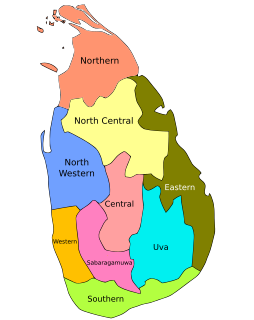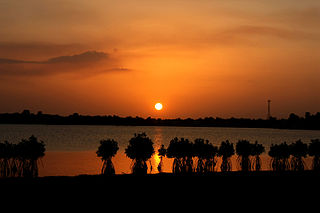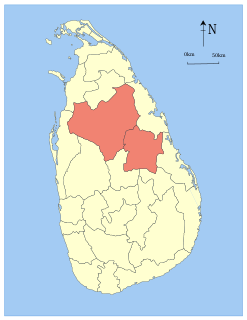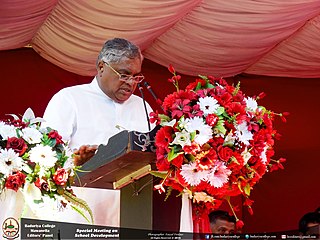Ellewatta | |
|---|---|
Village | |
| Country | |
| Province | Central Province |
| Time zone | UTC+5:30 (Sri Lanka Standard Time) |
Ellewatta is a village in Sri Lanka. It is located within Central Province.
Ellewatta | |
|---|---|
Village | |
| Country | |
| Province | Central Province |
| Time zone | UTC+5:30 (Sri Lanka Standard Time) |
Ellewatta is a village in Sri Lanka. It is located within Central Province.

Sri Lanka, formerly known as Ceylon, and officially the Democratic Socialist Republic of Sri Lanka, is an island country in South Asia. It lies in the Indian Ocean, southwest of the Bay of Bengal, and southeast of the Arabian Sea; it is separated from the Indian subcontinent by the Gulf of Mannar and the Palk Strait. Sri Lanka shares a maritime border with India and the Maldives. Sri Jayawardenepura Kotte is its legislative capital, and Colombo is its largest city and financial centre.

In Sri Lanka, provinces are the first level administrative division. They were first established by the British rulers of Ceylon in 1833. Over the next century most of the administrative functions were transferred to the districts, the second level administrative division. By the middle of the 20th century the provinces had become merely ceremonial. This changed in 1987 when, following several decades of increasing demand for a decentralization, the 13th Amendment to the 1978 Constitution of Sri Lanka established provincial councils. Currently there are nine provinces.

The Eastern Province is one of the nine provinces of Sri Lanka, the first level administrative division of the country. The provinces have existed since the 19th century but did not have any legal status until 1987 when the 13th Amendment to the Constitution of Sri Lanka established provincial councils. Between 1988 and 2006 the province was temporarily merged with the Northern Province to form the North Eastern Province. The capital of the province is Trincomalee.

North Western Province is a province of Sri Lanka. The province consists of the districts of Kurunegala and Puttalam. Its capital is Kurunegala, which has a population of 28,571. The province is known mainly for its numerous coconut plantations. Other main towns in this province are Chilaw (24,712) and Puttalam (45,661), which are both small fishing towns. The majority of the population of Wayamba province is of Sinhalese ethnicity. There is also a substantial Sri Lankan Moor minority around Puttalam and Sri Lankan Tamils in Udappu and Munneswaram. Fishing, prawn farming and rubber tree plantations are other prominent industries of the region. The province has an area of 7,888 km², and a population of 2,370,075.

North Central Province is one of the nine provinces of Sri Lanka, the first level administrative division of the country. The provinces have existed since the 19th century but did not have any legal status until 1987 when the 13th Amendment to the Constitution of Sri Lanka established provincial councils. The province is the largest by size, and second least populated in the country. The province consists of the districts of Anuradhapura and Polonnaruwa, both of which were important ancient Sri Lankan kingdoms. The climate is semi-arid, and the forests are dry evergreen forests.

UTC+05:30 is an identifier for a time offset from UTC of +05:30. This time is used in India and Sri Lanka, and was formerly used in Nepal. It is five and a half hours ahead of Coordinated Universal Time. Around 1.4 billion people live inside this time zone, making it the second most populous after UTC+08:00.

In Sri Lanka, districts are the second-level administrative divisions, and are included in a province. There are 25 districts organized into 9 provinces. Each district is administered under a district secretary, who is appointed by the central government. The main tasks of the district secretariat involve coordinating communications and activities of the central government and divisional secretariats. The district secretariat is also responsible for implementing and monitoring development projects at the district level and assisting lower-level subdivisions in their activities, as well as revenue collection and coordination of elections in the district. A district is divided into a number of Divisional Secretary's Divisions, which are in turn subdivided into 14,022 grama niladhari divisions. There are 331 DS divisions in the country.

The following is a list of schools in Sri Lanka.

The following outline is provided as an overview of and topical guide to Sri Lanka:
The 1978 Constitution of Sri Lanka provides for the election of members of Parliament from 22 multi-member electoral districts through the proportional representation electoral system.

The Central Province is one of the nine provinces of Sri Lanka, the first level administrative division of the country. The Central Province is primarily in the central mountainous terrain of Sri Lanka. It is the 6th largest province by area and is home to 2.5 million people. It is bordered by North Central Province to the north, Uva Province to the east, North Western Province to the west and Sabaragamuwa Province to the south and west. The province's capital is Kandy.
Janaka Bandara Tennakoon is a Sri Lankan politician and a member of the Parliament of Sri Lanka. He is currently the Minister of Lands and Land Development. He was educated at Dharmaraja College, Kandy. He contested as the Group Leader of the Matale District of the Central Province and was elected to the Provincial Council with a majority of Proportional Votes in 1993; Elected as a Member of Parliament with a majority of proportional votes in the General Election of 1994; Elected as a Member of Parliament from the District of Matale with the majority of proportional votes in the general election of 2000.

The Northern Province is one of the nine provinces of Sri Lanka, the first level administrative division of the country. The provinces have existed since the 19th century but did not have any legal status until 1987 when the 13th Amendment to the Constitution of Sri Lanka established provincial councils. Between 1988 and 2006 the province was temporarily merged with the Eastern Province to form the North Eastern Province. The capital of the province is Jaffna. The majority of the Sri Lankan Civil War was played out in this province.
Scientific research in Sri Lanka is carried out by several research institutions, however, historically Sri Lanka has been behind regional peers in research funding.

Northern Provincial Council is the provincial council for the Northern Province in Sri Lanka. In accordance with the Sri Lankan constitution, NPC has legislative power over a variety of matters including agriculture, education, health, housing, local government, planning, road transport and social services. The constitution also gives it powers over police and land but successive central governments have refused to devolve these powers to the provinces. NPC has 38 members elected using the open list proportional representation system.

Maheepala Herath is a Sri Lankan politician. The current Governor of the North Central Province, he was the former Chief Minister of Sabaragamuwa Province of Sri Lanka. He belongs to the Sri Lanka Freedom Party and part of the United People's Freedom Alliance.
Reginald Cooray is a Sri Lankan teacher and politician. He is a former provincial chief minister and a former government minister. He is the 5th Governor of the Northern Province, and was briefly the Governor of the Central Province in April 2018, his tenure lasting for less than 24 hours, making it the shortest of any Governorship in Sri Lankan history.
Provincial governments of Sri Lanka are the devolved governments of the nine Provinces of Sri Lanka. In accordance with the Sri Lankan constitution, provinces have legislative power over a variety of matters including agriculture, education, health, housing, local government, planning, road transport and social services. The constitution also gives them powers over police and land but successive central governments have refused to devolve these powers to the provinces.

COVID-19 vaccination in Sri Lanka is an ongoing immunisation campaign against severe acute respiratory syndrome coronavirus 2 (SARS-CoV-2), the virus that causes COVID-19, in response to the ongoing pandemic in the country. As of late July, Sinopharm's BBIBP-CorV accounted for 78% of the total 13.8 million vaccines obtained by Sri Lanka to date. The United States donated over 1.5 million Moderna COVID-19 vaccine through COVAX.